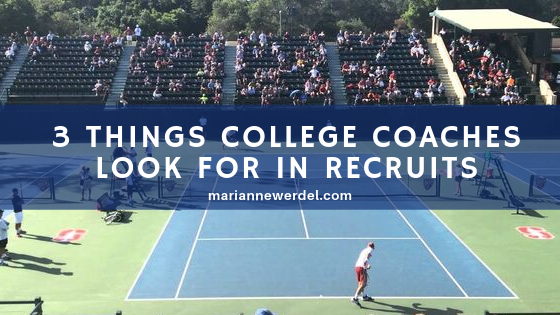
1. College Coaches Want to See the Player Compete
College coaches want to see that you are competing and improving. The simple fact is that college tennis is tougher than junior tennis. Coaches need to know you can rise to the level of play and adjust to the collegiate environment.
College coaches don’t want the players who run and hide from competition. Let me repeat, coaches don’t want players who run and hide from competition. If you are avoiding competition to protect your UTR or ranking, you are focusing on the wrong things.
We hear constant stories of how players play (or don’t play) to protect their UTR. This behavior of avoiding competition is exactly what college coaches don’t want to see… and yes, they do see when you retire and default matches. Coaches spot the hiders and gamers. You aren’t fooling them. They want players who compete to get better, not play games to have a higher UTR.

College coaches look at UTR as another tool (not a perfect science) when looking at a recruit, along with many other resources. It gives the coach a first indication on their level of play. It is one piece of the puzzle used to compile a profile on the student-athlete. It is similar to how the SAT/ACT test scores are used, along with grades, essays, and letters of recommendation to make the academic profile.
Coaches don’t use UTR as a 100% indicator of ability. They don’t use it to prioritize the recruits. They don’t use it to make their lineup. It is a beginning tool to get an indication of the level of competition.
“More important than a UTR is what I see when I watch them practice and compete. Are they fully engaged with good sportsmanship and wanting to get better?” D1 College Coach
Coaches also don’t want to see players stop competing and get complacent after they sign the letter of intent. There is nothing more frustrating for a
2. College Coaches Want to See Strong Academics
Good academics show the coach:

- Strong work ethic
- Time management skills
- Strong organizational skills
- Ability to transition to college academics
- When you make good decisions in the classroom, you are more apt to make good decisions with your tennis
3. College Coaches Want to See Strong Character
Coaches are looking for players who demonstrate:

- Good sportsmanship
-
Hard working - Gets along well with others
- Team-oriented in an individual sport
- Supportive of teammates
- Hates to lose
- Sets tennis and academic goals
- Coachable
- Works to get better
- Will try new things
- Good leadership qualities
- Good athletic skills
- Mentally and physically tough
I will finish with a great quote for parents and players from Coach Dick Gould,
“The goal is not a college scholarship. The goal is a college education.”
Good luck and thanks for reading!

Related Posts
Student-Athlete’s Recruiting Workbook
“College is a match to be made, not a prize to be won.”…
October 2, 2019Five Tips to Make Adversity Plus Failure Equal Success!
Thank you, Debbie Graham Shaffer, for sharing a great piece on the importance of our…
October 2, 2019

